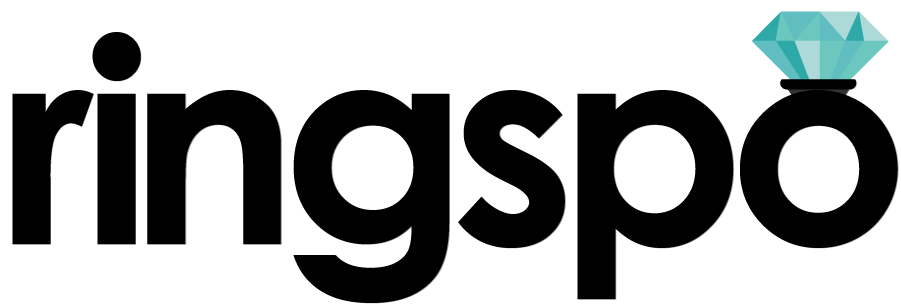Diamond appraisals: ultimate guide
Looking to understand whether you really need a diamond ring appraisal?
After all, you already have a receipt showing how much you paid and the diamond’s certificate, right?
In this blog you’ll learn:
- The three different types of appraisal, and which one you actually need
- Why your appraisal value may be different from what you paid and what to do about it
- How to find an appraiser you can trust

Ringspo is reader supported
Ringspo is reader-supported, which means we may receive a commission if you click a link to a retailer & subsequently make a purchase.
We feature links to several retailers to help readers find the one that is the best fit for them. Find out more about how Ringspo works here.
What are Diamond Appraisals?
A diamond appraisal is a document that describes its physical features, assesses its quality and assigns a value to it:
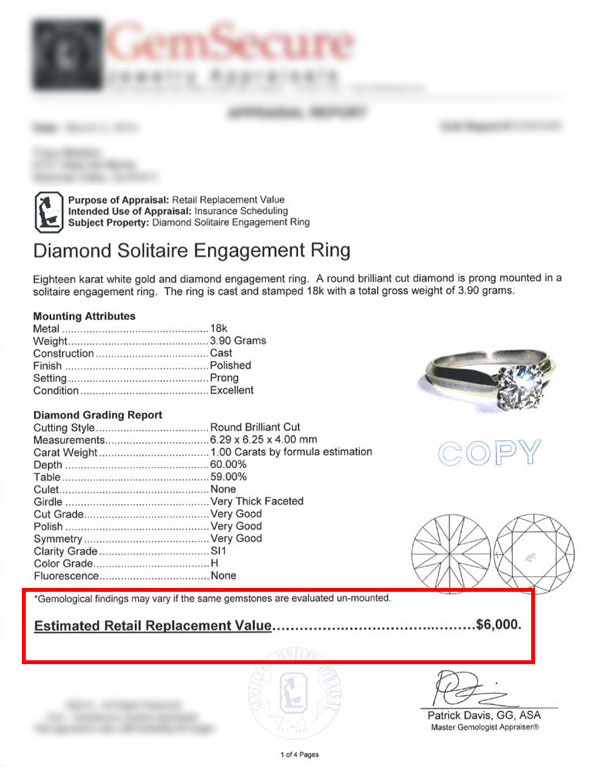
Diamond appraisals are performed by experts who not only have a solid understanding of diamonds themselves, but also their value.
They are a little different from a generic jewelry appraisal due to the specialized knowledge required to accurately determine a diamond’s characteristics and therefore estimate its value. While ideally they are a gemologist with a qualification from GIA, or similar independent body, this is not essential.
The appraiser will determine the 4 Cs of your diamond, examine the ring setting and the materials used and compare it to other similar pieces. After a thorough evaluation, they’ll provide you with detailed documentation about your diamond that will describe it and assign it a value.
A good appraiser should offer the following:
- A full explanation of their appraisal process including any lab work they intend to perform and what measurements they plan to take.
- Necessary credentials show that the are qualified to appraise diamonds.
- A clear understanding of why you need your diamonds appraised so you get the correct type of appraisal
- Documents containing a sealed statement of value and purposes containing the appraiser’s signature.
What are Diamond Appraisals Used for?
Diamond appraisals are most often commissioned for insurance purposes.
If you are requesting an insurance quote then the value of the item is one of the first questions asked:
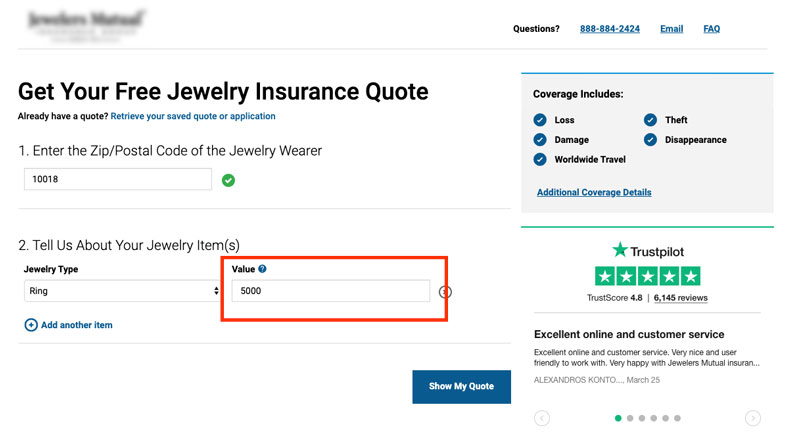
If your diamond jewelry is lost or stolen, you can submit your appraisal to the insurance company covering the diamonds as proof of its value to ensure that the compensation you receive is accurate.
Your appraisal will also determine how much your insurance will charge you for your premium.
As well as insurance, there are other reasons why you may want to get your diamonds appraised:
- To determine the approximate value of inherited jewelry if you are looking to sell it or distribute it amongst family members. Learn more about how to sell estate jewelry to ensure you approach the sale correctly.
- For potential tax purposes.
- To determine the value to accurately split the property in the event of a divorce.
- To prove that you own the diamonds if someone else makes a claim on them.
- In order to learn the value for a future sale of an auction opportunity.
Types of Appraisal
Appraisals will vary depending on their purpose and the quality, cut, and age of your diamonds. Typically, you will receive one of these three kinds of appraisals:
- Replacement value appraisal – this document will give you an estimated market price of a similar diamond if you needed to replace it due to loss or theft. This type of appraisal is the most common type of appraisal and is most commonly used for insurance purposes
- Fair market value appraisal – this document will give you an approximate amount that you would likely receive from a buyer if you were to sell your jewelry. This appraisal is also often used in estate settlements and for tax liability purposes.
- Comparable replacement value appraisal – if your diamond has historical significance or an uncommon cut, you may be issued one of these appraisals. They are similar to the replacement value appraisal but for items that can no longer be purchased.
It’s worth noting that if you are getting an appraisal in order to sell a diamond ring, then the type of appraisal that you are looking for is a ‘fair market appraisal’.
This is because the fair market is the price that someone will buy it from you, who will then need to factor in some profit before they can sell it on:

Difference Between Appraisals and Diamond Grading Reports
It’s likely when you bought your diamond jewelry that you receive a grading report or ‘certificate’ which details the 4Cs – cut, color, clarity and carat weight:
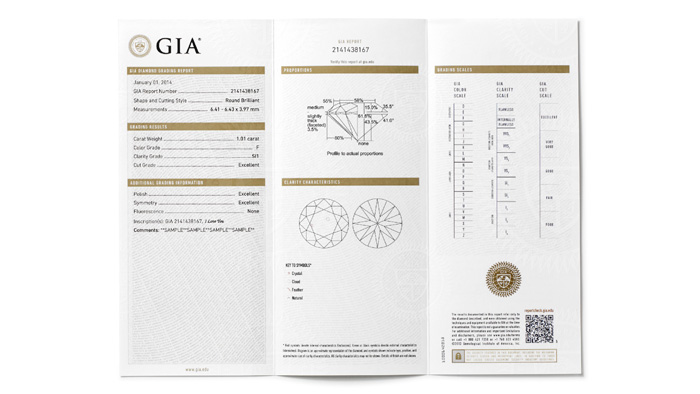
These details will also appear on your ring’s appraisal, but there is a difference between an appraisal and a diamond grading report.
The key differences between a diamond ring appraisal and a grading report are:
- A diamond ring appraisal will also include details of the ring setting, including which metals are used, whether there are other precious stones used in the jewelry and a weight for the entire item
- A diamond grading report doesn’t assign a value to a diamond, while an appraisal does
- The information on a diamond grading report doesn’t change over time. The physical properties of the stone will always be the same. The value of a diamond ring may change over time, so an appraisal can become outdated.
While an appraiser may ask you for your diamond grading report to help them with their paperwork, it doesn’t replace the need for a jewelry appraisal.
Do You Need an Appraisal if You Have a Receipt for Your Diamond?
Even if you have the original receipt for your diamond, you will still need an appraisal for insurance or tax purposes.
The receipt (or point-of-sale documents) will usually show a line or two about your diamond along with the price. It won’t go into full detail about its quality or any potential changes in value since it was purchased.
For example this Tiffany & Co. receipt for a $19,000 diamond ring includes no detail about the ring itself:
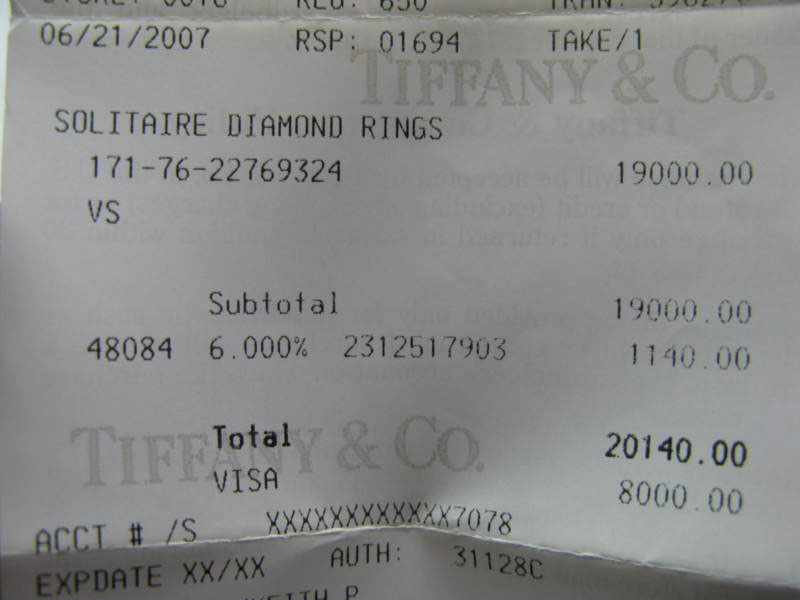
There are other aspects of a receipt that may not reflect the full value of your diamond. If your piece was purchased on sale or as part of a set, the receipt won’t be an accurate representation of the true value.
If you bought your jewelry second-hand e.g. from an antique store then the retailer may have also not realized its true worth when pricing it. An appraisal is the only way to ensure you have an accurate understanding of the your diamond jewelry.
What to watch out for with diamond appraisals
Diamond appraisals, like many things relating to diamonds, can be trickier than they first appear.
Whether you’re buying a diamond ring or selling it, it’s likely that the person on the other side of the transaction knows more about diamonds than you do.
If you’re not careful, this difference in knowledge can mean you come off second best.

Diamond Appraisal Price vs Purchase Price
Many jewelers will give you an appraisal when you buy a piece of diamond jewelry and, almost without fail, it will be higher than the price you paid for it.
Picture this: you buy a diamond ring and it is appraised for exactly the amount your paid for it. You think you got an OK deal, right? But you may be left wondering whether you could have got a better deal elsewhere…
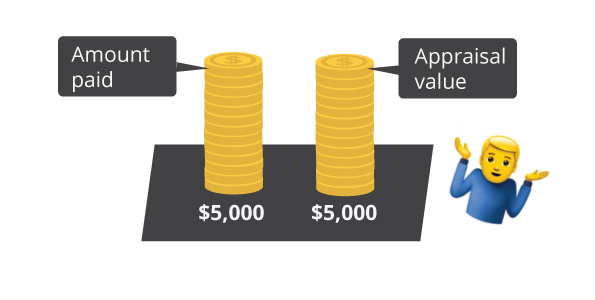
Now imagine that you buy your diamond ring and receive an appraisal showing its value is $2,500 higher than you paid. Wow! You got a great deal and you’re going to tell your friends!
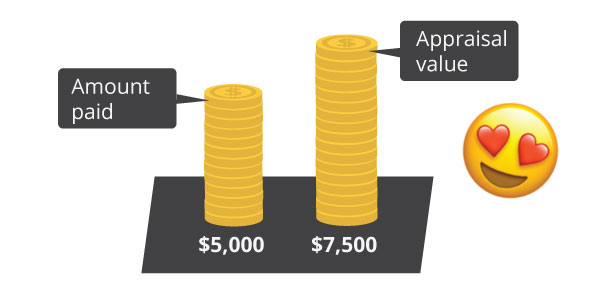
An appraisal that is higher than the true value of an item has two effects:
- Since insurance companies typically will not pay out the full value of an item, having an inflated value may allow you to receive a higher settlement if your diamond is lost or stolen.
- The flipside of this is that while this may seem like a good deal, a higher value will result in higher premiums from your insurance company. You’ll be paying more due to this inflated value.
For example, if you tell your insurance company that a ring is worth $5,000, the insurance premium may be $100:
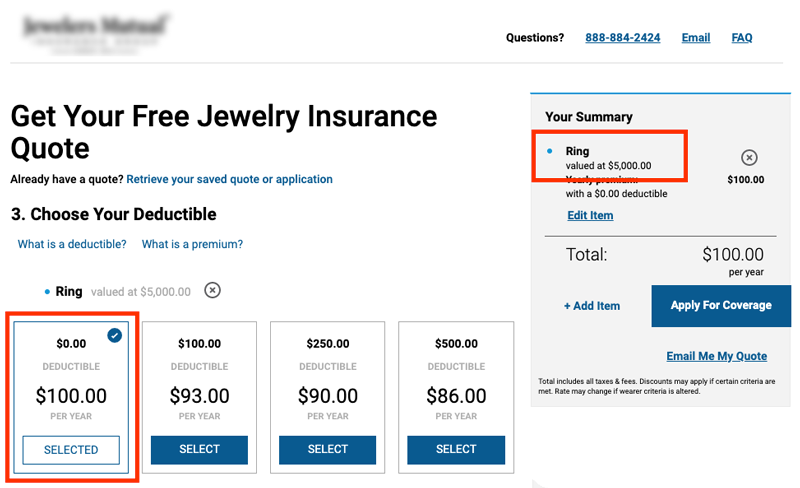
However, if a jeweler has give a falsely high appraisal value of $7,500, the insurance will also be 50% higher – $150 per year:
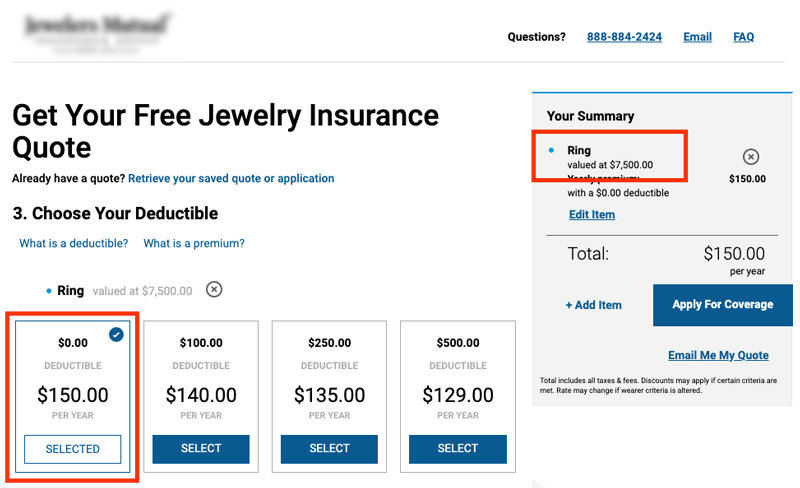
While this may not sound like a lot, over 20 years, this is an extra $1,000 you’re giving an insurance company for no real reason. If you do need to make a claim, the insurer will assess the value of the items and won’t necessarily pay out at the higher rate if it isn’t accurate.
It’s therefore smart to take a diamond retailer’s appraisal with a grain of salt.
To ensure you receive an accurate picture of the true value of your item. it’s better to find an independent appraiser.
Diamond Appraisal Price vs Resale Price
Typically a diamond appraisal will run much higher than the price you will receive if you sell the item. This is due to several factors, including:
- The appraisal you have may be a ‘replacement value’ appraisal, rather than a ‘fair market appraisal’.
- If your diamonds are encased in jewelry, people are less likely to pay as much for a previously owned item than they are a new one. This is especially true when it comes to engagement or wedding rings as there can be a stigma of purchasing one that is second hand.
- Retailers need to pay overhead costs. When selling to them, they will offer you less than the amount that they can receive when they resell the diamonds.
- Most people are unwilling to pay a higher price than the original retail price unless the running price of gemstones is substantially higher.
Diamond appraisals and conflicts of interest
The difference between the purchase price and the actual value also works the other way.
If you are looking to sell an item of jewelry, you should never take the appraisal value from someone who is interested in buying it.
They have no incentive to give you an accurate value, and every incentive to tell you it’s worth less than it is so that they can buy it for a lower price.
The lower the price they give you, the more profit they will have when they sell.
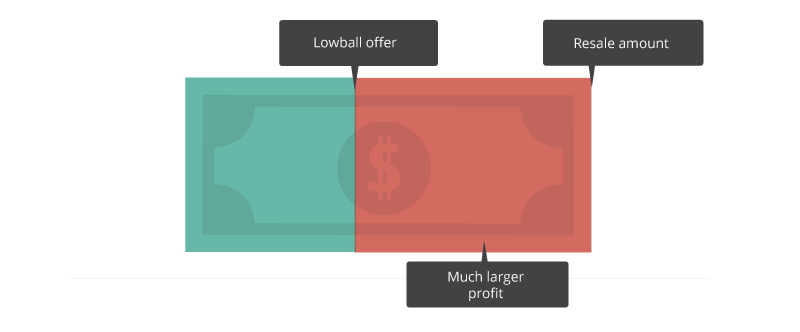
By giving you a high offer, they are reducing their own profit:

Pawn shops are especially notorious for this – giving low value appraisals and then bidding way under that because they know that people are likely to be in a rush to sell.
The most accurate appraisal is likely to be from someone who has no commercial interest in the outcome of the appraisal.
Finding a trustworthy appraiser for your diamond jewelry
In your search for an appraiser, you should look for an individual who has high ethical standards, understands the legalities surrounding diamond appraisals, and has experience in their field. To help you sort through appraisal listings, there are a few metrics you can use to ensure that your appraiser will perform their job accurately and professionally.
Qualification Requirements for a Diamond Appraiser
When hiring a diamond appraiser, they should be willing to cite the following qualifications that prove they are trained and knowledgeable in their work:
Gemological knowledge
One of the first things you should ask is to see if they have certification through an organization such as the GIA (Gemological Institute of America). These experts are well trained at appraising gems. They are very familiar with the 4 Cs of diamonds and will be able to provide accurate assessment of the quality of your diamonds.
Understanding of jewelry manufacturing
While this may not seem as important, your appraiser should have a well-rounded understanding of how jewelry is manufactured. This is especially true if your diamond is set in an engagement ring, a necklace, or another piece of jewelry. A fuller understanding of the industry as a whole ensures a more accurate appraisal.
Experience as a diamond appraiser
Don’t be afraid to ask for references or read reviews. Try to find someone who has had experience in appraising diamonds specifically. Someone who has specialized in diamond for a few years might be more qualified than a jewelry appraiser that has worked longer but specalizes in antique jewelry, for example.
Credentials through an association
There are several national associations who train appraisers and certify those who work under high ethical guidelines. Asking for these credentials will help you make an informed decision on choosing an appraiser.
Associations of Diamond Appraisers in the United States
In the United States, there are several well-known jewelry associations that require their members to follow a strict ethical standards. Finding an appraiser who has been certified by one of these organizations will give your peace of mind that your appraisal will be accurately conducted and without the risk of your diamonds being misplaced or stolen.
Do your due diligence to research any organization cited by the appraiser you want to commission. If you are concerned about their qualifications, call the association to ask for clarity and to ensure that the professional is actually certified through them. The following is a list of five well-known associations in the United States:
- Accredited Gemologists Association
- American Society of Appraisers
- International Society of Appraisers
- The Jewelry Judge Network
- National Association of Jewelry Appraisers
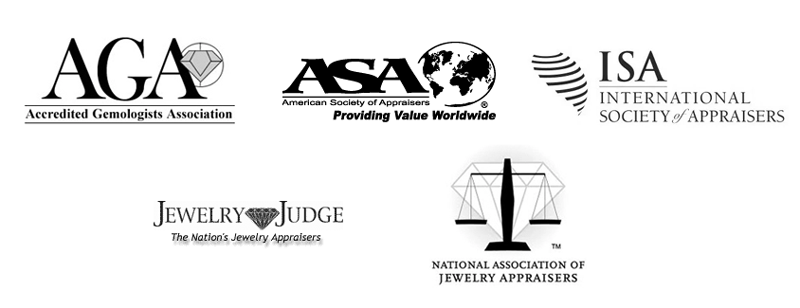
An appraiser with credentials will often charge more for their expertise than someone without the same level of expertise. However, choosing a better professional is well worth the extra cost. These highly trained individuals will draft the documentation that you need and should be able to stand behind their work if it is ever called into question.
Additionally, there have occasionally been times where an appraiser will notice something about a diamond that proves it is more valuable than it was previously assessed by a novice.
Appraising Loose Diamonds vs. Diamonds Mounted In Jewelry
Our last thing to know if not related to the quality or the honesty or the appraiser, but concerns the difficult that all appraisers can have when appraising a diamond that is set into jewelry.
Mounted diamonds are harder to appraise because the mounting itself can hide some of their characteristics, making the evaluation less precise.
For example, a yellow gold setting, like the one below, setting can make the stone look yellower than it actually is:
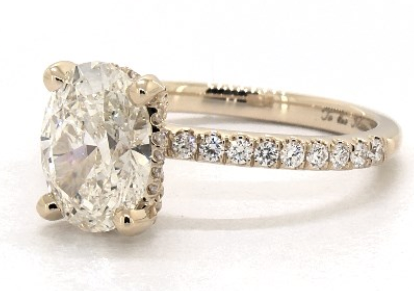
The warm yellow of the gold is visible through the diamond, making it appear more yellow that it should.
This means that the color grade assigned to the diamond would likely be lower than the actual grade of the diamond, which would result in a lower valuation.
When a diamond is mounted in a ring setting, it’s also impossible to accurately measure its carat weight. Instead, the carat weight must be estimated using the diamond’s measurements. Again, this can have a significant effect on the diamond’s valuation.
It’s not common that people are looking to sell a loose diamond, but if possible it’s a good idea to have a diamond appraised in its loose state, rather than when set into jewelry.
How is the value of a diamond appraisal determined?
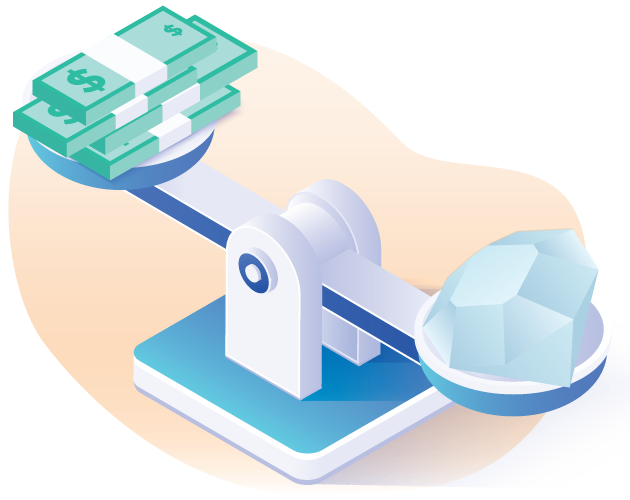
When an appraiser studies your diamonds, they will consider several aspects. A professional appraiser should be able to fully explain their process and defend the value they have given your gemstones. After they have finished, go over their work with them so that you fully understand the reasons behind their appraisal.
The following aspects will determine how your diamonds are appraised:
Quality of the diamond
An appraiser will look at the 4 C’s of a diamond. The C’s stand for cut, color, clarity, and carat. Each plays in the beauty and value of the diamond. While the cut is generally considered the more “important” in determining the sparkle of a diamond, carat weight is often the C that people are most concerned about. However, all of these characteristics, all will be considered.
Materials used in the setting
The expert will look at the materials used in the setting and the amount and proportion of precious metals used ie. the karat. They will look for general wear and tear as well as manufacturing marks.
Certificate accompanied by GIA or AGS
Both of these associations are highly trusted so your diamond will typically be valued more highly. If a diamond has a grading report.
Quality of the workmanship
The quality of the diamond’s cut as well as the setting of the piece will be taken into account. Those that are created by a master jeweler will be more valuable than others that are mass produced.
Current market value based on similar items
The appraiser will compare your diamonds and settings to similar products that are currently on the market. They will consider age, wear and tear, and the quality of your diamonds and metals.
Brand name makes a difference
Diamonds and jewelry from companies like Harry Winston, Tiffany and Co., Van Cleef, Bvlgari or Cartier will typically hold a higher value than a similar product created by a lesser-known company.

These brands are consistently valued higher and will sell for higher amounts as used diamond rings due to the cachet their brand brings.
How Often Should You Get Your Diamonds Appraised?
As the values of diamonds and jewelry fluctuate, you should aim to have your pieces re-appraised every 18 months. This will ensure that your documentation is up to date for both insurance and tax purposes.
If you lose your diamonds or they are stolen, recent appraisals should assist you in receiving your compensation from your insurance company.
